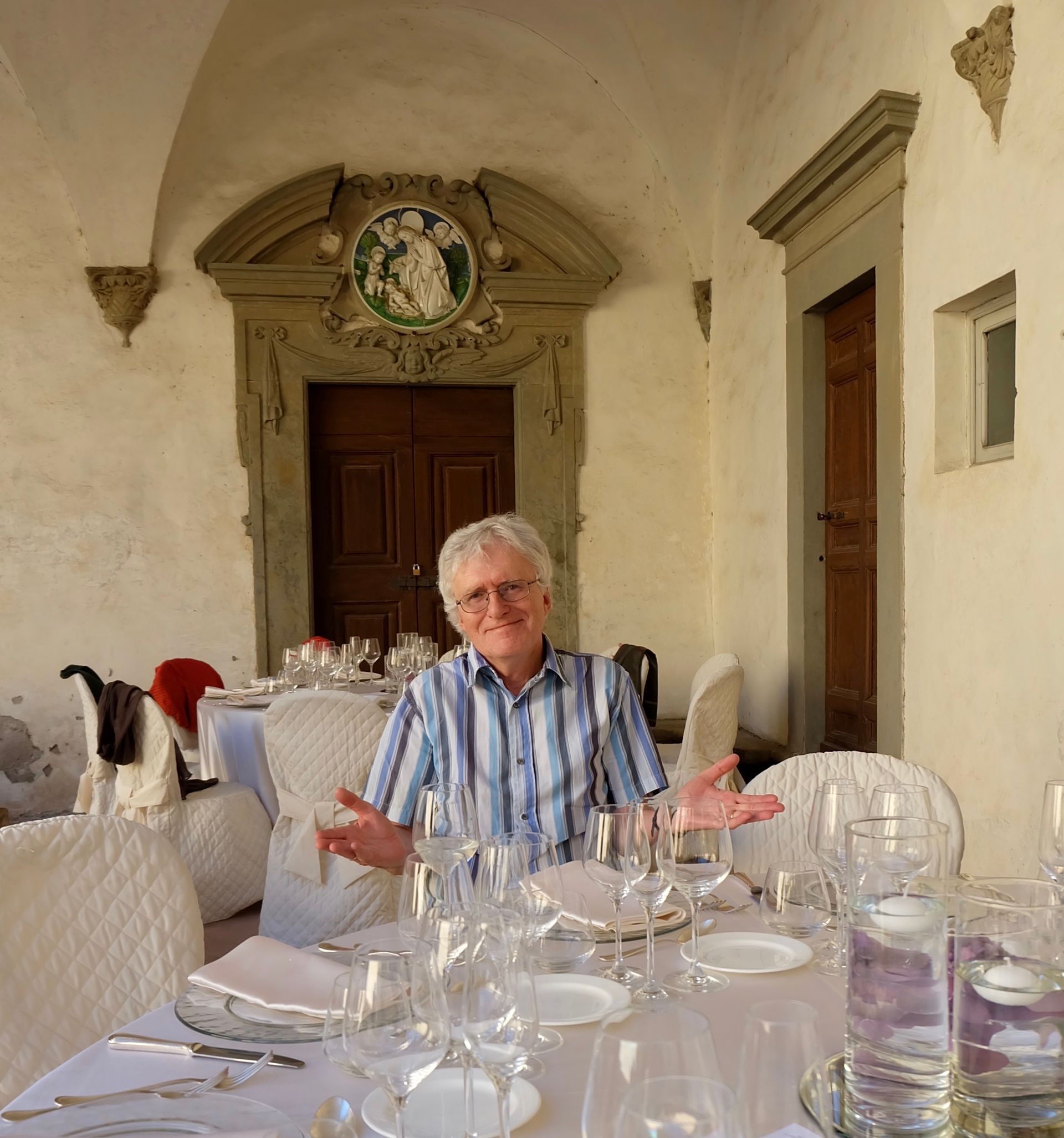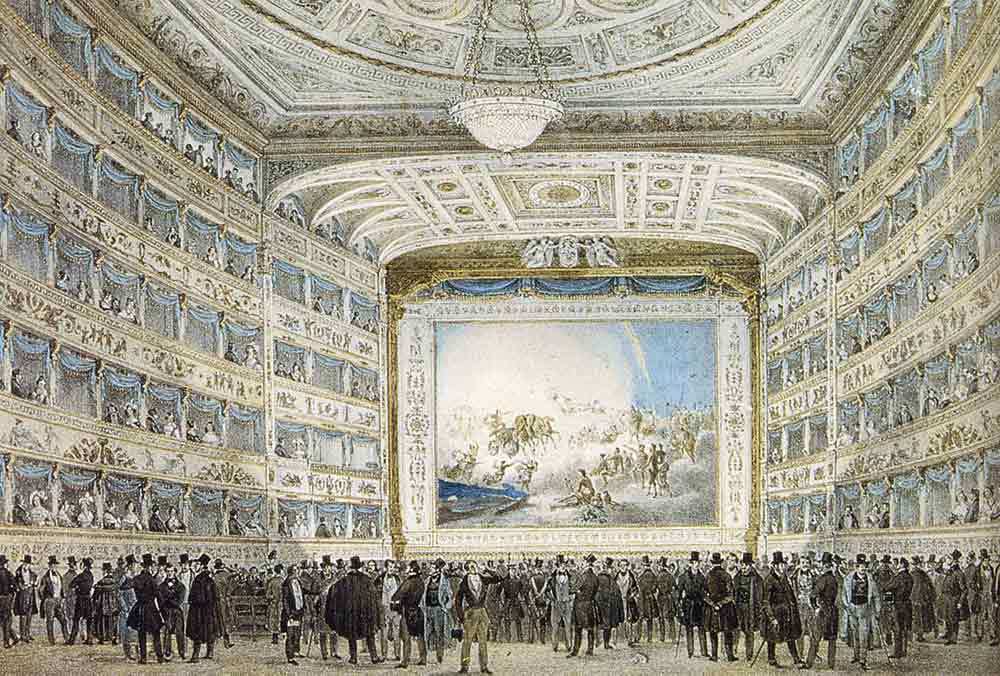Italian Opera from the Medici to Bellini
Interior of La Fenice opera house, Venice, 1837
THIS LECTURE SERIES HAS HAD TO BE POSTPONED BECAUSE OF CURRENT PUBLIC HEALTH CONCERNS
Joseph Talia OAM, singer, artistic director, teacher and scholar, will be giving a series of talks on Italian opera from the Renaissance to Bellini
between March and November 2020
at CO.AS.IT, 199 Faraday St, Carlton, from 6.30-8.00 pm on the last Tuesday of every month (except June). Entry is free, an aperitivo is included, but registration
is requested. Apart from his teaching work, Maestro Talia is the author of the trilogy A History of Vocal Pedagogy: Intuition and Science ; Vocal Science for Elite Singers ; and Italian Bel Canto in the Age of Vocal Science. Here is his description of each of the 8 lectures ……
Tuesday 31 March 2020, 6.30-8PM
1: The Renaissance in Florence. From Madrigals to Melodrama
In this talk, we shall introduce the socio-cultural conditions that prevailed during the Renaissance, making it a time of unprecedented artistic and intellectual creativity. The patronage of the Medici in Florence was critical to the establishment of the Camerata, a group of artists and intellectuals meeting in Count de’ Bardi’s home. These artists transformed polyphonic madrigals into staged melodrama through the use of monody (a single voice to tell the story). Claudio Monteverdi saw the potential of the idiom and knew that he could do much better: opera was in good hands.
Tuesday 28 April 2020, 6.30-8PM
2: Florentine Opera and canto fiorito
Whilst monody proved an excellent device for story-telling, it failed to satisfy the Italian love of melody, let alone their love for the human voice. The inevitable reaction was brought to fruition by Pietro Antonio Cesti in Venice, and especially by two young Sicilians: Alessandro Scarlatti in Naples and Antonio Pistocchi in Bologna. They returned to flowing, lilting melodies, reintroducing canto fiorito – a precursor to the bel canto singing, which reached its zenith with Rossini.
Tuesday 26 May 2020, 6.30-8PM
3: The Neapolitan School Versus the Bolognese School
Nicola Porpora, along with Pergolesi and Cimarosa, was one of the giants responsible for elevating the Neapolitan school to international prominence. Porpora’s achievements as a vocal pedagogue have become legendary. In 1733, he was called to London to establish a new company, the Opera of the Nobility. For a time, the Opera of the Nobility surpassed Handel’s own company. In the meantime, the Bolognese School was passed down from Antonio Pistocchi to his student, the castrato Antonio Bernacchi, who elevated the school to an even higher level of prestige.
Tuesday 28 July 2020, 6.30-8PM
4: The Naples of Caffarelli and Farinelli
The musical world of Baroque Naples was essentially built around the four conservatoriums of Santa Maria di Loreto, Sant’Onofrio, I Poveri di Gesù Cristo and La Pietà dei Turchini, established for the purpose of helping children in need. Despite the hardships which their students had to endure, the talent these schools produced remains unique in the annals of music and singing.
Tuesday 25 August 2020, 6.30-8PM
5: The Castrati and the Poetics of Wonder
This first Golden Age of bel canto is regarded by some as the zenith of the art form. The period was characterised by a sense of wonder, that is, the supremacy of the senses and the human creative imagination over reality. This period is characterised by the rise of the castrati and the extraordinary heights they were able to reach. Unlike most of the boys who became castrati to improve the socio-economic status of their families, Farinelli and Caffarelli came from well-off families. Farinelli remains widely recognised as the greatest singer of all time, and Caffarelli was his greatest rival.
Tuesday 29 September 2020, 6.30-8PM
6: Rossini and the Second Golden Age of Bel Canto
The second Golden Age of bel canto, at the start of the 19th century, coincided with the rise of Rossini and the decline of castrati, whose roles were increasingly given to contraltos. The beginning of Rossini’s career was marked by extraordinary innovation and creativity, which secured his place among the foremost composers in Western music. Rossini paved the way for Donizetti and Bellini’s dramatic bel canto. Their work signalled the beginning of the Romantic period. No presentation of Rossini can claim to be complete without mention of his muse and collaborator, prima donna assoluta Isabella Colbran.
Tuesday 27 October 2020, 6.30-8PM
7: Donizetti, Bellini and Romantic Bel Canto
The romantic bel canto period of Donizetti and Bellini saw the continuing decline of the castrati and the rise of the soprano and tenor. It was during this period that a new type of interpreter came to the fore – one capable of displaying great ecstasy, sadness, anguish and romantic vigour. We will compare and contrast Donizetti’s comedies such as Don Pasquale and L’Elisir d’Amore with his dramatic works such as Lucia di Lammermoor and Anna Bolena. Within this framework we shall examine the dramatic coloratura of Donizetti and Bellini.
Tuesday 24 November 2020, 6.30-8PM
8: Bellini and his Operas
The romantic bel canto period was characterised by changes in vocal technique which resulted in superior expressivity and emphasised darker timbres over clear ones. For our eighth and final lecture we will examine Bellini’s rustic La Sonnambula and romantic I Capuleti e i Montecchi along with his dramatic operas Norma and I Puritani. We will end by examining the impact that bel canto composers had on Verdi and Puccini, as well as the development of the great Verismo melodramas.
Joseph Talia
For over fifty years Joseph Talia has sung, directed and conducted opera, as well as achieving a PhD from La Trobe University on the issue of Cultural Hegemony and the Economics of the Performing Arts. He began his career in Melbourne, studied in Milan, was engaged to sing at the Teatro Eliseo in Rome, and has performed as a concert artist in Milan and Vercelli. His repertoire consists of fifty major tenor roles. He has been involved in over 140 opera productions and has directed La Bohème, Carmen, Andrea Chenier, Tosca and La Rondine. Dr Talia was artistic director of the Globe Opera Company for ten years, followed by Melbourne City Opera from 1997 to 2015. He was awarded the Order of Australia Medal in 2007 for his dedicated services to opera. He currently maintains a successful Voice studio in Melbourne, where in addition to his regular students he teaches visiting singers from New Zealand, Europe, Japan and Korea. He has taught five Sun Aria winners and two Reserve Award recipients, plus many other competitions winners. His students have sung in Australian and European opera houses, as well as Broadway and London’s West End. He is also in high demand as an adjudicator of international competitions, such as the Paolo Tosti in Ortona, the Mattia Battistini in Rieti, and the İzmir International in Turkey. He has conducted international masterclasses all over Europe.









